Dr.Teruo Higa’s
Living A Dream
- 2025
- Sep:#209 The Widespread Use of EM in Ecuador
- Sep:#208 The Widespread Use of EM in Chile
- Jul:#207 Peru, where EM has taken root throughout the country
- May:#206 EM Application Technology in Paraguay Begins to Evolve into Advanced Circular Agriculture
- May:#205 Practical Application of Soil Disinfectant-Free Cultivation Using EM Technology
- Apr:#204 How EM Use Has Spread Throughout the Philippines
- Mar:#203 How to Use EM to Fundamentally Solve the Problem of Agricultural Residue Burning
- Feb:#202 The Spread of EM technology in Germany
- Jan:#201 The 2nd Ichiro Masaki Memorial Universal Village EM International Conference
- Jan:#200 Cleanup of the Ala Wai Canal in Hawaii, where social bonds are strengthened using EM
- 2024
- Nov:#199 EM trials in India with bananas, tomatoes, and pomegranates
- Oct:#198 The Steadily Evolving EM Nature Farming Method at the Blue Sky Palace - Part 8
- Sep:#197 The Steadily Evolving EM Nature Farming Method at the Blue Sky Palace - Part 7
- Aug:#196 The Steadily Evolving EM Nature Farming Method at the Blue Sky Palace - Part 6
- Jul:#195 The Steadily Evolving EM Nature Farming Method at the Blue Sky Palace - Part 5
- Jun:#194 Steadily Evolving EM Nature Farming Method at the Blue Sky Palace - Part 4
- May:#193 Steadily Evolving EM Nature Farming Method at the Blue Sky Palace - Part 3
- May:#192 Steadily Evolving EM Nature Farming Method at the Blue Sky Palace - Part 2
- Apr:#191 Steadily Evolving EM Nature Farming Method at the Blue Sky Palace
- Mar:#190 Quantum Mechanical Effects of EM Gravitron Charcoal
- Mar:#189 The barrier space in Okinawa (Ryukyu Islands) has risen to another dimension
- Jan:#188 Sixty Days after Typhoon No.6
- 2023
- Oct:#187 Supermassive Typhoon No.6 and Subsequent Typhoon No. 11
- Sep:#186 Massive Typhoon No.6 that swallowed the Ryukyu Islands Graviton barrier
- Sep:#185 August 8th is World “EM Mudball Day”
- Aug:#184 A disease-free life depends on the health of the intestinal microbiome.
- Jul:#183 Trial and Error at the Blue-Sky Palace, Part 3
- Jun:#182 Trial and Error at the Blue-Sky Palace, Part 2
- Apr:#181 Trial and Error at the Blue-Sky Palace
- Mar:#180 Ala Wai Canal Cleanup Project in Waikiki, Hawaii
- Feb:#179 High-Yield, High-Quality Rice Production Using EM
- Feb:#178 The Progress the "Soil Preparation Workshop" of the Oishi 3-chan Club (Part 2)
- Jan:#177 Organic Farming Instructional Manual Using EM
- 2022
- Nov:#176 The Typhoon Situation in Okinawa in 2022
- Sep:#175 Third-Party Verification of the Graviton barrier in Okinawa Part-2
- Sep:#174 Third-Party Verification of the Graviton barrier in Okinawa
- Aug:#173 Ecosystem Changes Observed in Okinawa in 2021 Part-5
- Jun:#172 Ecosystem Changes Observed in Okinawa in 2021 Part-4
- May:#171 Ecosystem Changes Observed in Okinawa in 2021 Part-3
- Apr:#170 Ecosystem Changes Observed in Okinawa in 2021 Part-2
- Mar:#169 Koizumi Farm in Kamakura Continues to Evolve
- Feb:#168 Ecosystem Changes Observed in Okinawa in 2021 Part-1
- 2021
- Dec:#167 Enjoying EM Technology While Enriching the Local Ecosystem
- Nov:#166 A Case Study of the Use of EM in a Next Generation Free School in Tune with the Cycles of Nature
- Oct:#165 Typhoon conditions and flowers in Okinawa from August to October
- Sep:#164 Re-learning the origins of river purification using EM Cleaning up the Dairyuji River in Senami (Murakami City, Niigata Prefecture)
- Aug:#163 Measures Against Natural Disasters and Re-learning the Starting Point of EM
- Jul:#162 Summary of FFC (Foods for Children) Okinawa Forum 2021
- Jun:#161 Restoring the Vigor of an Old Tree and Purifying the Environment with EM Technology That Even an Amateur Can Do
- May:#160 The Public is Beginning to Recognize the Use of EM Smokeless Carbonizers
- Apr:#159 EM Hado (EM Graviton) that exerts quantum superposition effect over time
- Mar:#158 Virus-free Okinawan Plants Through Use of an EM Graviton Barrier
- Jan:#157 Enjoyable Farming for Self-Sufficiency that Even Amateurs Can Do
- 2020
- Dec:#156 EM quantum energy effect occurring in Okinawa
- Nov:#155 Implementing EM graviton farming as a flood countermeasure for apple orchards
- Oct:#154 The Latest Book on the Practical Uses of EM "You Are the One Who Draws Out the Power of Microorganisms," by Chizuko Nomoto
- Sep:#153 Application of EM technology to long periods of rain, lack of sunshine, storms, heavy rains, etc.
- Aug:#152 EM application in Kitanakagusuku village plant waste recycling yard
- Jul:#151 Natural Disaster Countermeasures Using EM Technology: Part 2
- Jul:#150 Natural Disaster Countermeasures Using EM Technology
- May:#149 How to make your home and workplace an energy spot by living a complete EM lifestyle: creating the ultimate source of health and environmental purification
- Apr:#148 EM, Viruses and the Pandemic
- Apr:#147 New agriculture applying quantum mechanics Part 2
- Apr:#146 New agriculture applying quantum mechanics
- Apr:#145 Wonderful EM Miracle
- 2019
- Nov:#144 The movie “Revival II” and the reality of Fukushima
- Oct:#143 Boundary dome and foliar spraying of EM・X GOLD and EM 3
- Oct:#142 Kirakira (Sparkling) Summer Vegetable Festa in 2019
- Aug:#141 Excessive salt inevitably causes salt damage
- Jul:#140 Diverse applications of charcoal Part 3
- Jun:#139 Diverse applications of charcoal Part 2
- Jun:#138 Diverse applications of charcoal
- Jun:#137 Purification power of salt
- May:#136 The degree of soil contamination is a reflection of the microflora
- May:#135 Definitive use of EM barriers to deal with typhoons
- May:#134 Implementing authentic Nature Farming
- May:#133 How to enhance healthy Hado (wave energy) by EM
- May:#132 Eating Dirt (Soil)
- May:#131 Hado (Wave energy) involved in health
- May:#130 Reaffirming EM technology to realize the essence of agriculture
- May:#129 The 2nd EM Producer Networking Meeting
- Apr:#128 Understanding the application of seawater and salt in crop cultivation
- Apr:#127 Prevention of Disasters by EM Technology
- Mar:#126 Quantum overlay effective utilization of EM
- Jan:#125 EM Disaster Recovery Support Projects in 2017
- 2018
- 2017
- Aug:#121 Escape from conventional agricultural traps
- Jul:#120 Limitation and important caveats regarding utilization of salt
- Jun:#119 EM Technology to Break Through the Limits of Pesticide-Free Strawberries
- May:#118 Application of barriers using EM rectification force
- Apr:#117 The 1st EM Produce Growers' Networking Conference
- Mar:#116 Sumizo kun: The Ultimate Versatile Carbonization Equipment
- Feb:#115 How to make and use simple carbonized and rectified ash
- Jan:#114 Achievements of 2016
- 2016
- Dec:#113 Definitive Measures Against Typhoons
- Nov:#112 International Conference on Universal Village
- Oct:#111 90% of Your Body is Microbes
- Sep:#110 Disaster Countermeasures Using EM
- Aug:#109: Changes in the Natural Environment by EM Barrier Domes in Okinawa
- Jul:#108: Multi-purpose Utilization of Activated EM with Seawater and Salt
- Jun:#107: Marine Day, when EM Mudballs and Activated EM are Applied Throughout Japan
- May:#106: The Function of EM and Gravitational Waves–Part 3
- Apr:#105: The Function of EM and Gravitational Waves–Part 2
- Feb:#104: The Function of EM and Gravitational Waves
- Feb:#103: The Importance of Phototrophic Bacteria in EM
- 2015
- Dec:#102: Results of Environmental Forum "Utsukushima EM Paradise" 2015
- Nov:#101: Environmental Forum "Utsukushima EM Paradise" 2015
- Oct:#100: A New Phase of Limit Breakthrough Using EM
- Sep:#99: A New Phase of Limit Breakthrough through EM
- Aug:#98: The Tokyo Bay Area Began Creating a Truly Livable Hometown
- Jul:#97: Rectifying Effects of EM
- Jun:#96: Lake Suwa Sousei lecture
- May:#95: In Order to Further Ensure Limit Breakthrough
- Apr:#94: Theatrical Release of the Documentary Film SOSEI-Revival to Enlighten People on the New Possibilities of Microorganisms
- Mar:#93: What Underlies Limit Breakthrough (Part 2)
- Feb:#92: EM Functions to Break Through Limits
- Jan:#91: At the Start of 2015
- 2014
- Dec:#90: Looking Back at 2014
- Nov:#89: Shikoku EM FESTA 2014, Virtuous Circle Conference in Matsuyama, Ehime Prefecture
- Oct:#88: Using EM to Deal with Weather Disasters (Part 2)
- Sep:#87: Current Status of Radioactivity Measures Using EM in Fukushima
- Aug:#86: APNAN (Asia Pacific Natural Agriculture Network) 25th Anniversary Conference in 2014
- Jul:#85: Using EM to Deal with Weather Disasters
- Jun:#84: Substantial Improvement of Soil
- May:#83: The Energy Rectification Force of EM
- Apr:#82: The Annual 18th EM Technology Exchange Meeting and Tohoku Conference in Shichigahama
- Mar:#81: Salmon going upstream in Kitaura (Kasumigaura)
- Feb:#80: The Microbiome Again
- Jan:#79: Inauguration of the Federation of Diet Members Who Use and Apply Effective Microorganisms
- 2013
- Dec:#78: Receiving an Honorary Doctoral Degree from Rajamangala University of Technology in Thailand
- Nov:#77: The Use of EM in School Education in Bhutan
- Oct:#76: Well of Bonding
- Sep:#75: The Background to EM Not Being Employed by Public Institutions to Deal with Radiation
- Aug:#74: Dealing with Disaster: Using EM in Crisis Management
- Jul:#73: EM Events on Ocean Day
- Jun:#72: Using EM to Deal With Heat Stroke and Summer Heat Fatigue
- May:#71: An EM Model Town in Malaysia
- Apr:#70: Steps the Japanese Government is Taking to Deal with Radiation: Are They Really Safe?
- Mar:#69: EM Group Disaster Reconstruction Aid Project in Fukushima
- Feb:#68: EM and Microbiomes (Microbial Flora)
- Jan:#67: A Necessary Evil is Still Evil
- 2012
- Dec:#66: The 17th National EM Technology Exchange Conference / Hokkaido Conference in Sapporo
- Nov:#65: EM Forum 2012 in Okinawa and the Environmental Forum in Fukushima
- Oct:#64: 2012 EM Forum
- Sep:#63: A New Earth Saving Revolution
- Aug:#62: The Asahi Newspaper’s Misguided Reports About EM
- Jul:#61: Using EM in Radioactive Contamination Measures in Fukushima Prefecture
- Jun:#60: The Effects of Using EM to Inhibit the Absorption of Radioactivity as Confirmed in Fukushima
- May:#59: Recovery Support for the Great East Japan Earthquake
- Apr:#58: The Royal Kingdom of Thailand, in which EM Functions as a Set Government Policy
- Mar:#57: Report on the Measures Taken by Kingdom of Thailand Using EM to Deal with Polluted Water
- Feb:#56 EM™ as Part of National Policy in Thailand to Deal with Sanitation Issues Resulting from the Flood of 2011
- Jan:#55 The Law of Syntropy (Revitalization)
- 2011
- Dec:#54 EM Forum 2011
- Nov:#53 Shikoku EM Festa 2011- Zenjunkan no Wa (Virtuous Circle) Tokushima Conference in Naruto -
- Oct:#52 The Mystery of Interim Safety Values for Radioactive Material
- Sep:#51 Successful Radiation Countermeasures Using EM
- Aug:#50 Events on Sea Day in which EM Mud Balls are Thrown into the Water and Activated EM is Applied.
- May:#47 Dealing with the Damage Caused by the Eastern Japan Earthquake
- Apr:#46 Eastern Japan Earthquake
- Mar:#45 The 16th National EM Technology Hokuriku Conference in Fukui
- Feb:#44 More Thoughts on Avian Influenza and Foot-and-Mouth Disease
- Jan:#43 Happy New Year!
- 2010
- Dec:#42 Shikoku EM FESTA 2010・Zenjunkan no wa (Virtuous Circle) Fellowship Conference in Tobe, Ehime Prefecture
- Nov:#41 EM Forum 2010
- Oct:#40: My Thanks to the EM™ Volunteers Who Helped in the Fight Against Foot-and-Mouth Disease in Miyazaki Prefecture
- Sep:#39 International EM Mud Ball Day
- Jul:#37 Poland EM Forum 2010
- Jun:#36 EM Countermeasures Against Foot-and-Mouth Disease
- May:#35 Abnormal Weather
- Apr:#34 EM Activities in Thailand: Finding Solutions to the Challenges Facing the Nation
- Mar:#33 New Developments in the Evolution of EMTM in Thailand
- Feb:#32 Results Starting to Be Seen at the Mikasa Project
- Jan:#31 Towards an EM-Use Society
- 2009
- Dec:#30 EM Summit
- Nov:#29 The System in Penang State in Malaysia that Made the World EMTM Mudball Day a Success
- Oct:#28 The "World EM Mudball Day" in Malaysia
- Sep:#27 Validating EMTM Medicine: Case Study Reports from EM Users 2009. (Part 3)
- Sep:#26 Validating EMTM Medicine: Case Study Reports from EMTM Users 2009. (Part 2)
- Jul:#25 Validating EMTM Medicine: Case Study Reports from EMTM Users 2009. (Part 1)
- Jun:#24 Activities to Disseminate EM-Focused Nature Farming in China
- May:#23 Use of EMTM in Response to Swine Flu
- Apr:#22 Using EM to Solve Public Administrative Costs
- Mar:#21 Reaffirming the Versatility of EM
- Jan:#20 The Beginning of a New Era
- 2008
#77: The Use of EM in School Education in Bhutan
EM was introduced in Bhutan in 1990, and though specialists sent from foreign countries (starting with the EU and including from Japan) were opposed to the use of EM, experimental results in the field showed greater success than expected and the Bhutanese government began actively supporting EM. Bhutan has a population of about 700,000, with little level land and limited access because of the mountainous terrain. It is widely known that Bhutan’s national policy involves building up the nation through increasing the GNH (gross national happiness).Since the entire country of Bhutan has been designated as a world natural heritage site, they are moving away from the use of chemical fertilizers and agrochemicals towards organic agriculture. EM is being widely used to recycle food waste and to transform animal excreta into organic fertilizer, and self-sustaining gardens at schools play a major role in promoting this.
The majority of high schools in Bhutan are boarding schools, because the rugged terrain limits travel. Because of this each school has a self-sustaining garden to supply the dormitories, and are actively using EM in these gardens. Since many of the students return to farm villages after graduation, APNAN (the Asia Pacific Natural Agriculture Network) is proactively supporting these endeavors.
(APNAN was started to commemorate the international conference on Kyusei Nature Farming and EM Technology, held at Khon Kaen University in Thailand in 1989. There have been numerous international workshops and conferences held at the Kyusei Nature Farming Center in Saraburi Province, and other than Brunei and Central Asia, Nature Farming and EM Technology have been disseminated throughout all counties. Since APNAN’s founding I have served as its chairperson.)
First, to commemorate the start of World Food Day (WFD) in 2002, we organized a contest among the high schools’ self-sustaining gardens that are using EM, awarding the Higa trophy (the Dr. Teruo Higa Prize) and a cash award, and twenty schools participated. As a result EM has spread to all the high schools, over thirty schools, and this has become a major part of Nature Farming in Bhutan.
This movement took place simultaneously with a school agricultural program event including elementary, middle and high schools, and afterwards we received support from the FAO (United Nations’ Food and Agriculture Organization), and EM has begun to steadily spread further into elementary and middle schools. Below is a report from Mr. Yujiro Sano of APNAN, who advises the project.
- - - - - - - - - - - - - - - - - - - - - - - - - - - - - - - - - - - - - - - - - -- - - - - - - - - - - - - - - -
Ceremony to Award the SAP Outstanding Schools (September 16, 2013)
I participated in this year’s awards ceremony for the outstanding schools, the largest annual event in the School Agriculture Program (hereafter SAP). Approximately 190 of the 551 schools in Bhutan participate in SAP, and the school that has the most outstanding school vegetable garden among the HSS (basically equivalent to a high school in Japan), LSS (equivalent to middle schools in Japan), and elementary schools, is given the award. About 100 schools are using EM.
Place: Bjishon MSS, Gasa District
Main Program:
1. Principal’s Welcoming Remarks
2. Speech by Dr. Tashi Samdup, representative of the Council for RNR Research (hereafter CoRRB).
3. Speech by the governor of Gasa District, Dasho Sonam Jigme.
4. Display and Sale of organic farm products and processed goods from Bjishon region.
5. Entertainment by students of the Bjishon school (including a parade, dances, a debate on whether global warming is affecting agriculture, a quiz of farmers, a play, and other events.)
6. SAP Awards Presentation:
Udzromg LSS of Tashigang District was awarded the top award in the LSS division by APNAN. FAO awarded the Tendruk HSS in Samtse District the top award in the HSS division. The CPS in Chungkha District was awarded the top award in the elementary school division by WEP. All the money awarded was provided by FAO.
Main sponsor: FAO
Note: CPS (Community Primary School) are grades 1-6, while LSS (Lower Secondary Schools) have grades 1-8.
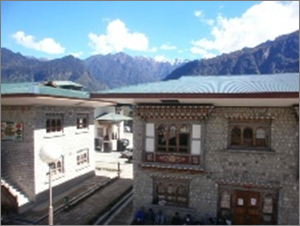
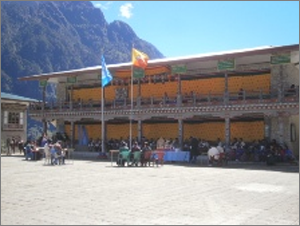
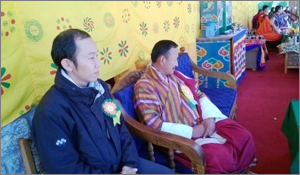
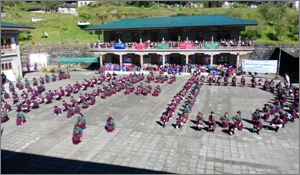
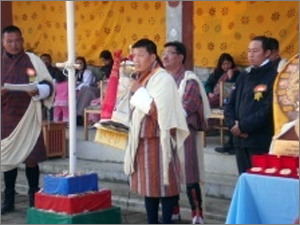
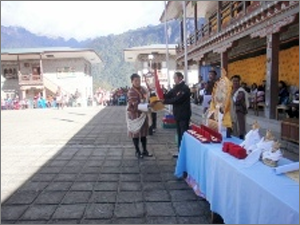
The awards ceremony for top SAP schools held at Bjishon MSS, Gasa District, on World Food Day. The photos on the top show the school buildings at Bjishon MSS. The photo in the middle (left) shows the Governor of Gasa District (on the right) and Mr. Sano (on the left); in the photo on the middle right, the entire student body spells out the letters WFD, for World Food Day. Photos on the bottom show the Higa Trophy being presented from APNAN to Udzromg LSS, and the speech given by a representative of that school, thanking APNAN for the award.
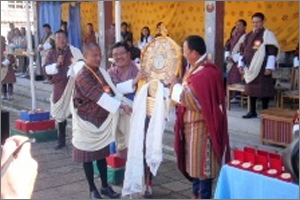
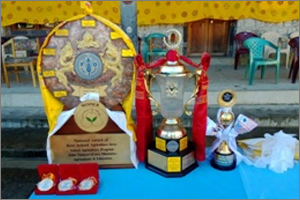
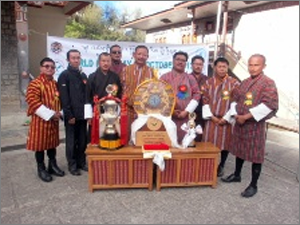
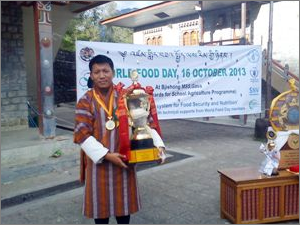
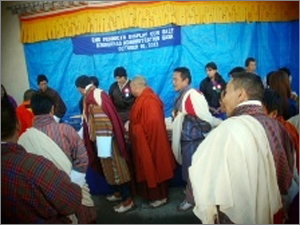
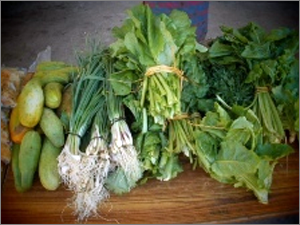
The awards ceremony for top SAP schools held at Bjishon MSS, Gasa District, on World Food Day. The photo on the top left show Tendruk HSS’s award. The photo on the top right shows the three trophies; from left to right, the HSS trophy, the LSS trophy (the Higa Trophy), and the CPS trophy. The middle row of photos shows the commemorative photo taken after the awards ceremony. The bottom row of photos shows the organic farm products from the district on sale throughout the ceremony. Various types of vegetables, mushrooms, cheese and other products were on sale. Gasa District is an organic farming district, and all the farm products of the district are organic.
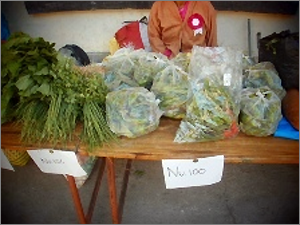
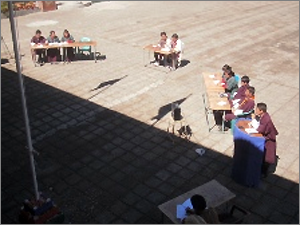
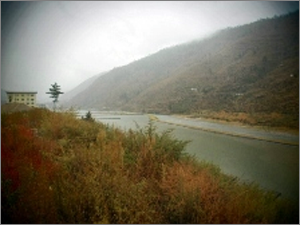
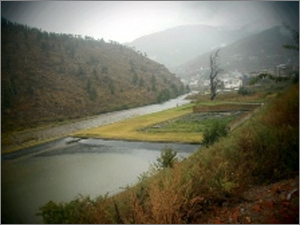

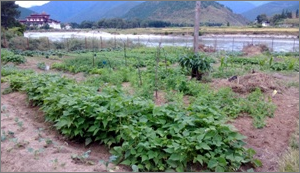
The photos on the top row, taken at the awards ceremony for top SAP schools on World Food Day, show vegetables on display (left hand photo), and on the right, the student debate on the topic “Whether or not global warming is affecting agriculture.” The middle row of photos shows the open style water treatment plant I inspected in Thimphu along the river. We are exploring a project to use EM to reduce odors, and then collect the data. The bottom row shows the farm at Punakha HSS that I inspected. Cultivation of crops there is proceeding extremely well.
Editor’s Picks
-
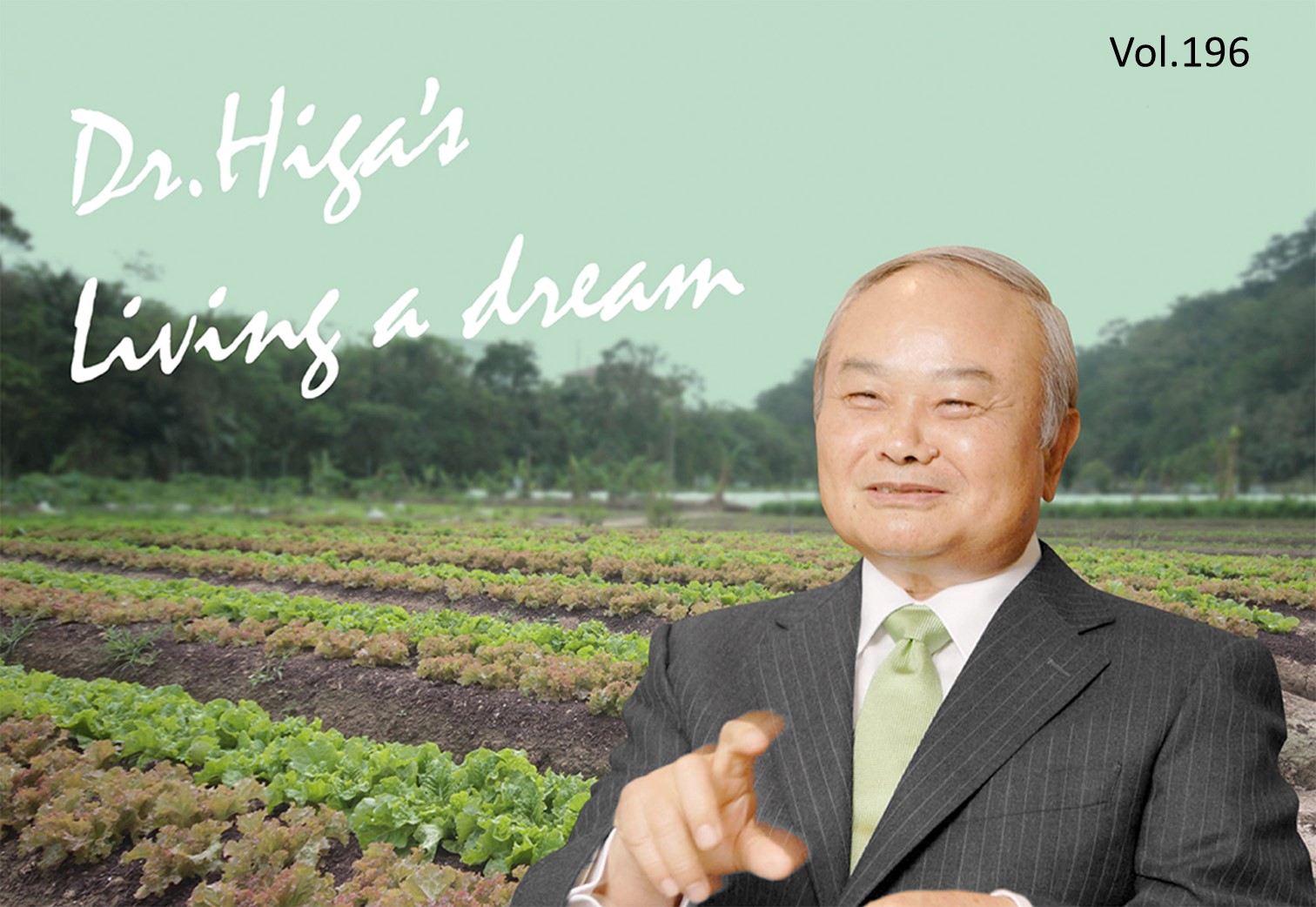
#196 The Steadily Evolving EM Nature Farming Method at the Blue Sky Palace - Part 6 -
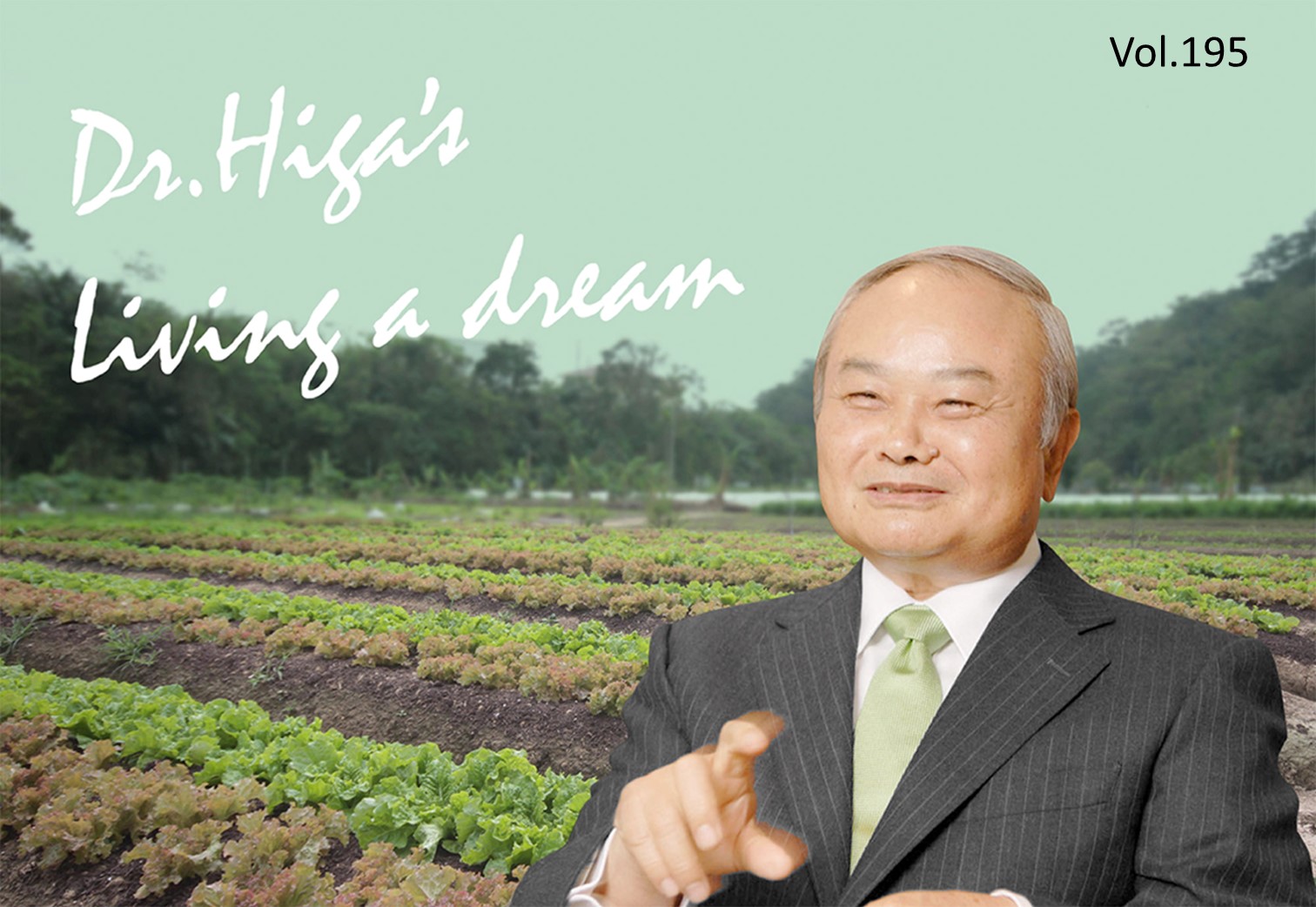
#195 The Steadily Evolving EM Nature Farming Method at the Blue Sky Palace - Part 5 -
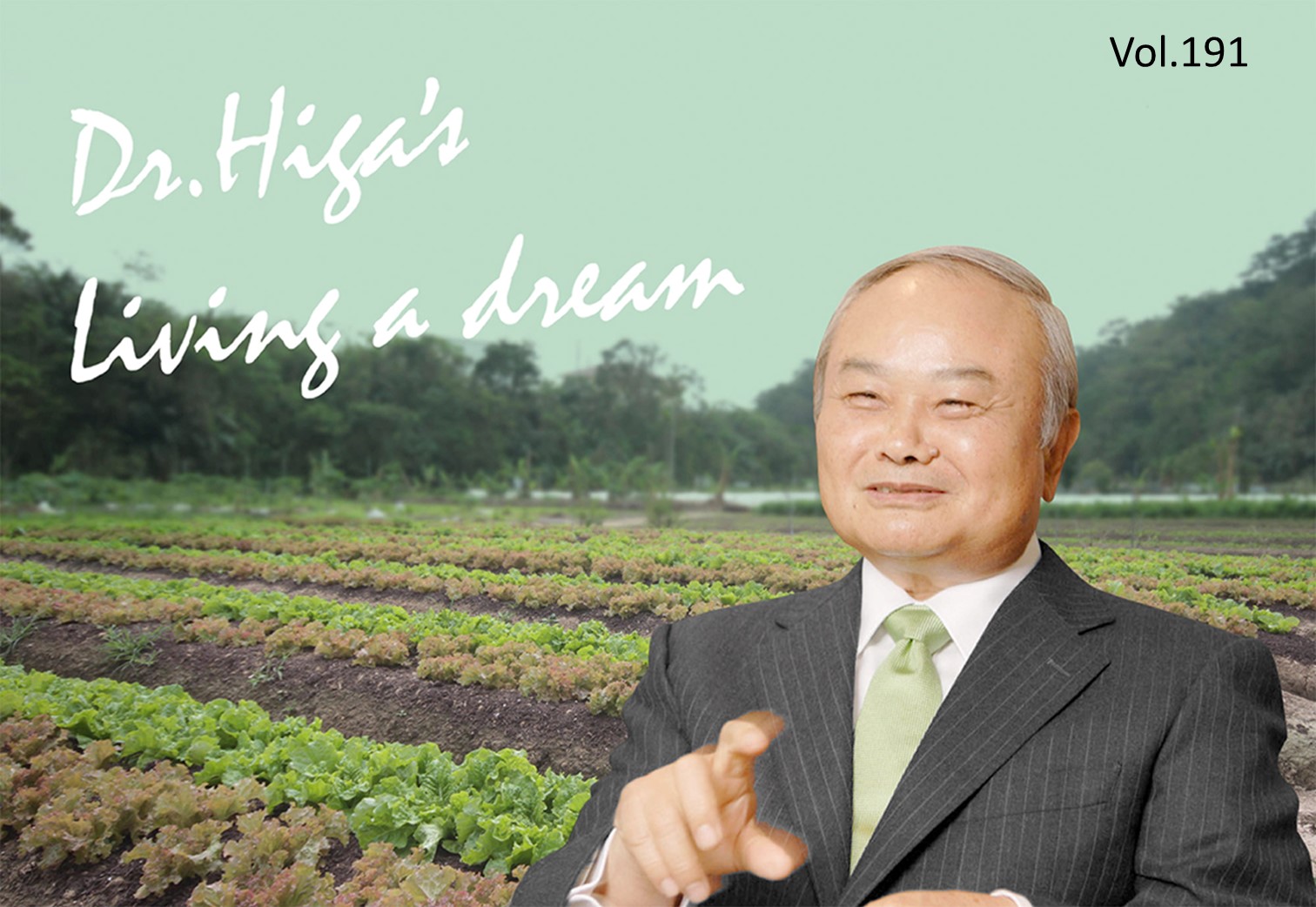
#191 Steadily Evolving EM Nature Farming Method at the Blue Sky Palace -
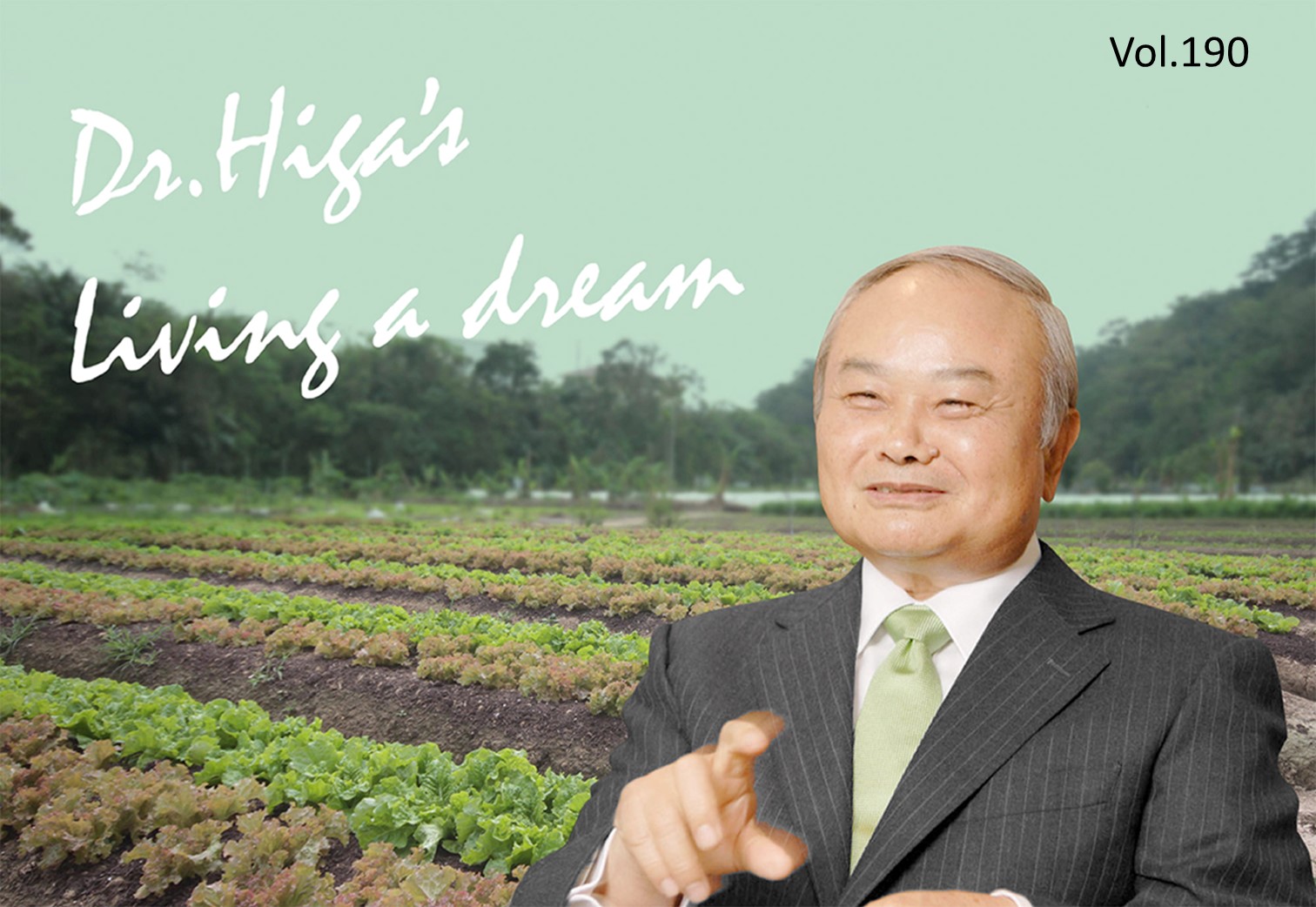
#190 Quantum Mechanical Effects of EM Gravitron Charcoal
- 2025
- Sep:#209 The Widespread Use of EM in Ecuador
- Sep:#208 The Widespread Use of EM in Chile
- Jul:#207 Peru, where EM has taken root throughout the country
- May:#206 EM Application Technology in Paraguay Begins to Evolve into Advanced Circular Agriculture
- May:#205 Practical Application of Soil Disinfectant-Free Cultivation Using EM Technology
- Apr:#204 How EM Use Has Spread Throughout the Philippines
- Mar:#203 How to Use EM to Fundamentally Solve the Problem of Agricultural Residue Burning
- Feb:#202 The Spread of EM technology in Germany
- Jan:#201 The 2nd Ichiro Masaki Memorial Universal Village EM International Conference
- Jan:#200 Cleanup of the Ala Wai Canal in Hawaii, where social bonds are strengthened using EM
- 2024
- Nov:#199 EM trials in India with bananas, tomatoes, and pomegranates
- Oct:#198 The Steadily Evolving EM Nature Farming Method at the Blue Sky Palace - Part 8
- Sep:#197 The Steadily Evolving EM Nature Farming Method at the Blue Sky Palace - Part 7
- Aug:#196 The Steadily Evolving EM Nature Farming Method at the Blue Sky Palace - Part 6
- Jul:#195 The Steadily Evolving EM Nature Farming Method at the Blue Sky Palace - Part 5
- Jun:#194 Steadily Evolving EM Nature Farming Method at the Blue Sky Palace - Part 4
- May:#193 Steadily Evolving EM Nature Farming Method at the Blue Sky Palace - Part 3
- May:#192 Steadily Evolving EM Nature Farming Method at the Blue Sky Palace - Part 2
- Apr:#191 Steadily Evolving EM Nature Farming Method at the Blue Sky Palace
- Mar:#190 Quantum Mechanical Effects of EM Gravitron Charcoal
- Mar:#189 The barrier space in Okinawa (Ryukyu Islands) has risen to another dimension
- Jan:#188 Sixty Days after Typhoon No.6
- 2023
- Oct:#187 Supermassive Typhoon No.6 and Subsequent Typhoon No. 11
- Sep:#186 Massive Typhoon No.6 that swallowed the Ryukyu Islands Graviton barrier
- Sep:#185 August 8th is World “EM Mudball Day”
- Aug:#184 A disease-free life depends on the health of the intestinal microbiome.
- Jul:#183 Trial and Error at the Blue-Sky Palace, Part 3
- Jun:#182 Trial and Error at the Blue-Sky Palace, Part 2
- Apr:#181 Trial and Error at the Blue-Sky Palace
- Mar:#180 Ala Wai Canal Cleanup Project in Waikiki, Hawaii
- Feb:#179 High-Yield, High-Quality Rice Production Using EM
- Feb:#178 The Progress the "Soil Preparation Workshop" of the Oishi 3-chan Club (Part 2)
- Jan:#177 Organic Farming Instructional Manual Using EM
- 2022
- Nov:#176 The Typhoon Situation in Okinawa in 2022
- Sep:#175 Third-Party Verification of the Graviton barrier in Okinawa Part-2
- Sep:#174 Third-Party Verification of the Graviton barrier in Okinawa
- Aug:#173 Ecosystem Changes Observed in Okinawa in 2021 Part-5
- Jun:#172 Ecosystem Changes Observed in Okinawa in 2021 Part-4
- May:#171 Ecosystem Changes Observed in Okinawa in 2021 Part-3
- Apr:#170 Ecosystem Changes Observed in Okinawa in 2021 Part-2
- Mar:#169 Koizumi Farm in Kamakura Continues to Evolve
- Feb:#168 Ecosystem Changes Observed in Okinawa in 2021 Part-1
- 2021
- Dec:#167 Enjoying EM Technology While Enriching the Local Ecosystem
- Nov:#166 A Case Study of the Use of EM in a Next Generation Free School in Tune with the Cycles of Nature
- Oct:#165 Typhoon conditions and flowers in Okinawa from August to October
- Sep:#164 Re-learning the origins of river purification using EM Cleaning up the Dairyuji River in Senami (Murakami City, Niigata Prefecture)
- Aug:#163 Measures Against Natural Disasters and Re-learning the Starting Point of EM
- Jul:#162 Summary of FFC (Foods for Children) Okinawa Forum 2021
- Jun:#161 Restoring the Vigor of an Old Tree and Purifying the Environment with EM Technology That Even an Amateur Can Do
- May:#160 The Public is Beginning to Recognize the Use of EM Smokeless Carbonizers
- Apr:#159 EM Hado (EM Graviton) that exerts quantum superposition effect over time
- Mar:#158 Virus-free Okinawan Plants Through Use of an EM Graviton Barrier
- Jan:#157 Enjoyable Farming for Self-Sufficiency that Even Amateurs Can Do
- 2020
- Dec:#156 EM quantum energy effect occurring in Okinawa
- Nov:#155 Implementing EM graviton farming as a flood countermeasure for apple orchards
- Oct:#154 The Latest Book on the Practical Uses of EM "You Are the One Who Draws Out the Power of Microorganisms," by Chizuko Nomoto
- Sep:#153 Application of EM technology to long periods of rain, lack of sunshine, storms, heavy rains, etc.
- Aug:#152 EM application in Kitanakagusuku village plant waste recycling yard
- Jul:#151 Natural Disaster Countermeasures Using EM Technology: Part 2
- Jul:#150 Natural Disaster Countermeasures Using EM Technology
- May:#149 How to make your home and workplace an energy spot by living a complete EM lifestyle: creating the ultimate source of health and environmental purification
- Apr:#148 EM, Viruses and the Pandemic
- Apr:#147 New agriculture applying quantum mechanics Part 2
- Apr:#146 New agriculture applying quantum mechanics
- Apr:#145 Wonderful EM Miracle
- 2019
- Nov:#144 The movie “Revival II” and the reality of Fukushima
- Oct:#143 Boundary dome and foliar spraying of EM・X GOLD and EM 3
- Oct:#142 Kirakira (Sparkling) Summer Vegetable Festa in 2019
- Aug:#141 Excessive salt inevitably causes salt damage
- Jul:#140 Diverse applications of charcoal Part 3
- Jun:#139 Diverse applications of charcoal Part 2
- Jun:#138 Diverse applications of charcoal
- Jun:#137 Purification power of salt
- May:#136 The degree of soil contamination is a reflection of the microflora
- May:#135 Definitive use of EM barriers to deal with typhoons
- May:#134 Implementing authentic Nature Farming
- May:#133 How to enhance healthy Hado (wave energy) by EM
- May:#132 Eating Dirt (Soil)
- May:#131 Hado (Wave energy) involved in health
- May:#130 Reaffirming EM technology to realize the essence of agriculture
- May:#129 The 2nd EM Producer Networking Meeting
- Apr:#128 Understanding the application of seawater and salt in crop cultivation
- Apr:#127 Prevention of Disasters by EM Technology
- Mar:#126 Quantum overlay effective utilization of EM
- Jan:#125 EM Disaster Recovery Support Projects in 2017
- 2018
- 2017
- Aug:#121 Escape from conventional agricultural traps
- Jul:#120 Limitation and important caveats regarding utilization of salt
- Jun:#119 EM Technology to Break Through the Limits of Pesticide-Free Strawberries
- May:#118 Application of barriers using EM rectification force
- Apr:#117 The 1st EM Produce Growers' Networking Conference
- Mar:#116 Sumizo kun: The Ultimate Versatile Carbonization Equipment
- Feb:#115 How to make and use simple carbonized and rectified ash
- Jan:#114 Achievements of 2016
- 2016
- Dec:#113 Definitive Measures Against Typhoons
- Nov:#112 International Conference on Universal Village
- Oct:#111 90% of Your Body is Microbes
- Sep:#110 Disaster Countermeasures Using EM
- Aug:#109: Changes in the Natural Environment by EM Barrier Domes in Okinawa
- Jul:#108: Multi-purpose Utilization of Activated EM with Seawater and Salt
- Jun:#107: Marine Day, when EM Mudballs and Activated EM are Applied Throughout Japan
- May:#106: The Function of EM and Gravitational Waves–Part 3
- Apr:#105: The Function of EM and Gravitational Waves–Part 2
- Feb:#104: The Function of EM and Gravitational Waves
- Feb:#103: The Importance of Phototrophic Bacteria in EM
- 2015
- Dec:#102: Results of Environmental Forum "Utsukushima EM Paradise" 2015
- Nov:#101: Environmental Forum "Utsukushima EM Paradise" 2015
- Oct:#100: A New Phase of Limit Breakthrough Using EM
- Sep:#99: A New Phase of Limit Breakthrough through EM
- Aug:#98: The Tokyo Bay Area Began Creating a Truly Livable Hometown
- Jul:#97: Rectifying Effects of EM
- Jun:#96: Lake Suwa Sousei lecture
- May:#95: In Order to Further Ensure Limit Breakthrough
- Apr:#94: Theatrical Release of the Documentary Film SOSEI-Revival to Enlighten People on the New Possibilities of Microorganisms
- Mar:#93: What Underlies Limit Breakthrough (Part 2)
- Feb:#92: EM Functions to Break Through Limits
- Jan:#91: At the Start of 2015
- 2014
- Dec:#90: Looking Back at 2014
- Nov:#89: Shikoku EM FESTA 2014, Virtuous Circle Conference in Matsuyama, Ehime Prefecture
- Oct:#88: Using EM to Deal with Weather Disasters (Part 2)
- Sep:#87: Current Status of Radioactivity Measures Using EM in Fukushima
- Aug:#86: APNAN (Asia Pacific Natural Agriculture Network) 25th Anniversary Conference in 2014
- Jul:#85: Using EM to Deal with Weather Disasters
- Jun:#84: Substantial Improvement of Soil
- May:#83: The Energy Rectification Force of EM
- Apr:#82: The Annual 18th EM Technology Exchange Meeting and Tohoku Conference in Shichigahama
- Mar:#81: Salmon going upstream in Kitaura (Kasumigaura)
- Feb:#80: The Microbiome Again
- Jan:#79: Inauguration of the Federation of Diet Members Who Use and Apply Effective Microorganisms
- 2013
- Dec:#78: Receiving an Honorary Doctoral Degree from Rajamangala University of Technology in Thailand
- Nov:#77: The Use of EM in School Education in Bhutan
- Oct:#76: Well of Bonding
- Sep:#75: The Background to EM Not Being Employed by Public Institutions to Deal with Radiation
- Aug:#74: Dealing with Disaster: Using EM in Crisis Management
- Jul:#73: EM Events on Ocean Day
- Jun:#72: Using EM to Deal With Heat Stroke and Summer Heat Fatigue
- May:#71: An EM Model Town in Malaysia
- Apr:#70: Steps the Japanese Government is Taking to Deal with Radiation: Are They Really Safe?
- Mar:#69: EM Group Disaster Reconstruction Aid Project in Fukushima
- Feb:#68: EM and Microbiomes (Microbial Flora)
- Jan:#67: A Necessary Evil is Still Evil
- 2012
- Dec:#66: The 17th National EM Technology Exchange Conference / Hokkaido Conference in Sapporo
- Nov:#65: EM Forum 2012 in Okinawa and the Environmental Forum in Fukushima
- Oct:#64: 2012 EM Forum
- Sep:#63: A New Earth Saving Revolution
- Aug:#62: The Asahi Newspaper’s Misguided Reports About EM
- Jul:#61: Using EM in Radioactive Contamination Measures in Fukushima Prefecture
- Jun:#60: The Effects of Using EM to Inhibit the Absorption of Radioactivity as Confirmed in Fukushima
- May:#59: Recovery Support for the Great East Japan Earthquake
- Apr:#58: The Royal Kingdom of Thailand, in which EM Functions as a Set Government Policy
- Mar:#57: Report on the Measures Taken by Kingdom of Thailand Using EM to Deal with Polluted Water
- Feb:#56 EM™ as Part of National Policy in Thailand to Deal with Sanitation Issues Resulting from the Flood of 2011
- Jan:#55 The Law of Syntropy (Revitalization)
- 2011
- Dec:#54 EM Forum 2011
- Nov:#53 Shikoku EM Festa 2011- Zenjunkan no Wa (Virtuous Circle) Tokushima Conference in Naruto -
- Oct:#52 The Mystery of Interim Safety Values for Radioactive Material
- Sep:#51 Successful Radiation Countermeasures Using EM
- Aug:#50 Events on Sea Day in which EM Mud Balls are Thrown into the Water and Activated EM is Applied.
- May:#47 Dealing with the Damage Caused by the Eastern Japan Earthquake
- Apr:#46 Eastern Japan Earthquake
- Mar:#45 The 16th National EM Technology Hokuriku Conference in Fukui
- Feb:#44 More Thoughts on Avian Influenza and Foot-and-Mouth Disease
- Jan:#43 Happy New Year!
- 2010
- Dec:#42 Shikoku EM FESTA 2010・Zenjunkan no wa (Virtuous Circle) Fellowship Conference in Tobe, Ehime Prefecture
- Nov:#41 EM Forum 2010
- Oct:#40: My Thanks to the EM™ Volunteers Who Helped in the Fight Against Foot-and-Mouth Disease in Miyazaki Prefecture
- Sep:#39 International EM Mud Ball Day
- Jul:#37 Poland EM Forum 2010
- Jun:#36 EM Countermeasures Against Foot-and-Mouth Disease
- May:#35 Abnormal Weather
- Apr:#34 EM Activities in Thailand: Finding Solutions to the Challenges Facing the Nation
- Mar:#33 New Developments in the Evolution of EMTM in Thailand
- Feb:#32 Results Starting to Be Seen at the Mikasa Project
- Jan:#31 Towards an EM-Use Society
- 2009
- Dec:#30 EM Summit
- Nov:#29 The System in Penang State in Malaysia that Made the World EMTM Mudball Day a Success
- Oct:#28 The "World EM Mudball Day" in Malaysia
- Sep:#27 Validating EMTM Medicine: Case Study Reports from EM Users 2009. (Part 3)
- Sep:#26 Validating EMTM Medicine: Case Study Reports from EMTM Users 2009. (Part 2)
- Jul:#25 Validating EMTM Medicine: Case Study Reports from EMTM Users 2009. (Part 1)
- Jun:#24 Activities to Disseminate EM-Focused Nature Farming in China
- May:#23 Use of EMTM in Response to Swine Flu
- Apr:#22 Using EM to Solve Public Administrative Costs
- Mar:#21 Reaffirming the Versatility of EM
- Jan:#20 The Beginning of a New Era
- 2008
